contents

Who Protects Students with ADHD When Policy Changes?

Overcoming Myths and Mistrust About ADHD in the Black Community

Disparities in ADHD Care for BIPOC Children and Adolescents

Is a Medication Holiday an Option for Your Child with ADHD?

Using Cultural Humility to Engage Black Families
Joy Banks, PhD, draws on real-world examples and experiences for a powerful conversation about how Black families experience ADHD, make treatment decisions, and navigate schools and healthcare systems.

Midyear Reboot: Five Strategies for Building Effective Habits in Children and Teens
Part of parenting is helping children develop good habits and break ineffective ones. At the midpoint of the school year, make sure they pivot toward success.

Behavior Strategies for Raising Kids with ADHD
Parenting a child with ADHD comes with a unique set of challenges that most parents aren’t equipped to navigate, especially when traditional behavior management approaches don’t work.

Help Your Teen Plan a Rewarding Gap Year
Taking a break between high school and college can be beneficial for some young adults. Now is a good time for families to discuss what a gap year might be like for their graduating students.

Webinar: Using Cultural Humility to Engage Black Families About ADHD
Joy Banks, PhD, draws on real-world examples to explore how families understand ADHD, make treatment decisions, and engage with schools and healthcare providers. She examines how cultural perspectives shape these experiences and how educators and professionals can move beyond assumptions to build meaningful, collaborative partnerships with families of Black children diagnosed with ADHD.

Awareness of Sex Differences Can Better Help Girls with ADHD
Bright, capable girls with ADHD are often overlooked because their symptoms don’t fit outdated stereotypes—leaving many to quietly struggle. A CHADD expert unpacks why the diagnosis gap exists and what families can do to make sure girls get the support they deserve.

Using Cultural Humility to Engage Black Families About ADHD
Joy Banks, PhD, draws on real-world examples to explore how families understand ADHD, make treatment decisions, and engage with schools and providers. She examines how cultural perspectives shape these experiences—and how educators and professionals can move beyond assumptions to build meaningful, collaborative partnerships with families of Black children diagnosed with ADHD.

Changing the Way You Communicate with Your Young Adult
Relationships change, and hopefully grow, as teens move into young adulthood. Parents can help strengthen communication and set the tone for their future relationship.

Medication Essentials for Empowered Decisions
Carolyn Lentzsch-Parcells, MD, unpacks for families the complexities of medication treatment. She explains the importance of early and accurate diagnosis, the differences between stimulant and nonstimulant medications, and why a comprehensive evaluation is essential.

Experiencias y Consejos de Padres con Hijos con TDAH
En esta serie especial en colaboración con El Futuro, escuchamos a Mayra, Shirley, Yudith y Sairy, cuatro mamás que comparten sus experiencias criando hijos con TDAH.

How to Manage Family Holiday Stress
The holidays can feel like a whirlwind—especially when you’re managing ADHD. Ari Tuckman, PsyD, breaks down why the season can be so overwhelming in this popular podcast. He shares practical, ADHD-friendly strategies to ease stress, stay grounded, and actually enjoy what matters most.

Managing ADHD and Disruptive Behavior Disorders
When disruptive behavior disorders occur alongside ADHD, the challenges can feel overwhelming for families. Psychologist Tish Taylor offers insight into commonly used interventions, practical tips for putting them into action, and resources to support parents raising children or teens with these co-occurring conditions.

Getting Your Kids with ADHD Organized
The holiday season can make home organization feel nearly impossible—especially when you’re juggling children, busy schedules, and the constant movement of family life. Professional organizer Holly Hitchcock Graff shares practical strategies to help your household during this hectic time of year.

Treating Children for ADHD Can Benefit the Next Generation
Addressing ADHD in children can help them be successful in their lives and may help to improve the lives of their future children.

Do I Have to Talk to My Parents? Conversations That Help, Not Hurt
Parents play an important role as their teens transition to independent adulthood. Sometimes the conversations are not easy or comfortable—especially when teens have ADHD or another brain-based condition.

Create Calm: It Really Matters!
Your child’s ability to regulate emotions is affected by what they are expected to manage. How can you build a supportive foundation of serenity at home?

Calming Down and Cooling Off
The skills needed to regulate emotions involve the same skills that are often areas of difficulty for kids with ADHD.

The Choice Is in the Details: Medication Options for ADHD
Podcast & Video Review
Medication is a proven treatment for ADHD. It can improve attention span and decrease distractibility and overactivity. While medication is effective for many people, how do you know if it is right for you or your child?

Toppling the Myths of ADHD
Raising ADHD awareness often includes debunking myths that surround the disorder and treatments. We address a few of the common misunderstandings.

The Impact of Screen Time on Neurodivergent Kids
What are the benefits and risks of digital play and video games for children diagnosed with ADHD, autism spectrum disorder, and learning disabilities? Clinical psychologist Randy Kulman shares research on how kids learn from screens.
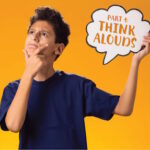
Retooling Strategies for Greater Success: Think Alouds
Part one in a series of articles for parents and educators on going deeper with executive function tasks that are resistant to intervention.

Music Lessons for Kids with ADHD
You’ve heard about the benefits, now you need guidance to make music study work for your child.

Providing Perspective Through My ADHD Story
She shares her story with her students—because she was them.

Together for Every Child
This Children’s Panel Webinar, presented by the ADHD Europe and the ADHD Awareness Coalition, explores how families and educators can work together to create supportive spaces for children with ADHD.

Octubre es el Mes de Concientización sobre el TDAH
CHADD’s information specialists recently spoke about ADHD with Univision Noticias for ADHD Awareness Month. They shared reliable information about ADHD in children and adults, how it is diagnosed, and the supports that can make a real difference for families.
This interview is in Spanish. Esta entrevista está en español.

How to Help Your Teen with ADHD Engage in Self-Advocacy
ADHD awareness often includes debunking some of the myths that surround the disorder and its treatment. We address a few of the common misunderstandings.
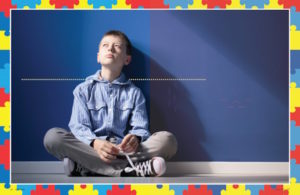
Managing ADHD Symptoms in Youth with Autism
Does your child have both autism and ADHD, and is able to take medication? They may be eligible to participate in a research study on managing ADHD symptoms with medication in children with autism. There are twelve study locations and participants will be compensated.

Learning Disabilities & ADHD
Many students with ADHD also have learning differences—and recognizing both early can make all the difference. Educator Kim Miller, MA, shares how to spot the signs and use simple, effective strategies to help your child learn with confidence.

Using Context to Build and Enhance Executive Functioning
Students struggle with executive functioning for a variety of reasons—ADHD, anxiety, depression, short-term stress, fatigue, concussion, etc. . Margaret Foster, MAEd, explores how educators and specialists can recognize EF demands, identify student needs, and know how to initiate the process of effective interventions.

Helping Teens Become Resilient Adults
The teen years can be difficult for someone who has ADHD and often set the tone for their adulthood. Helping teens develop resiliency skills can get them off to a better start in life.

Cognitive Disengagement Syndrome: What Is It and Why Does It Matter?
What is cognitive disengagement syndrome, formerly known as sluggish cognitive tempo? How does being “internally distracted” affect a person’s daily life and activities? How is CDS identified in children and adolescents, and can it be treated?

What’s Good About Technology for Neurodiverse Kids
Parents will be most successful when they can be clear and pragmatic about their goals for technology usage with their children.

Navigating Screen Time Recommendations with Neurodiverse Children
Help your children benefit from technology while minimizing potential risks by focusing on the quality of screen time, leveraging educational tools, and establishing clear, consistent rules.

Viewing an Endless Stream of Videos Can Undermine Attention
ADHD Weekly
If your attention is already limited, looping through video shorts can make it even more difficult to pay attention in other areas of your life.

When Smart Children, Teens and Young Adults on the Autism Spectrum Have ADHD
ADHD Weekly
More than half of the individuals diagnosed with autism spectrum disorder (ASD) also have ADHD. Yet often their ADHD is overlooked and not adequately treated.

Sección 504 y IEP: Cómo preparar a sus hijos con TDAH para su éxito escolar
Podcast & Video Review
Los niños con TDAH necesitan acomodaciones personalizadas para sus necesidades específicas para tener la mejor experiencia de aprendizaje durante su vida escolar

Stop the Chaos! Tips for Creating a Peaceful Household When Mom Has ADHD
Podcast & Video Review
It can be difficult to keep up with the multiple priorities of career, home, and family. Terry Matlen, ACSW, suggests some practical tips to help create a calmer home for your family while still meeting your own needs.

Strategies and Solutions for Social Anxiety in Children and Teens with ADHD
Podcast & Video Review
Sharon Saline, PsyD, will show you ways to help your child learn how to participate more fully in social situations with greater confidence and less self-criticism.

One in Three Students with ADHD Not Receiving Accommodations
ADHD Weekly
A third of students who cope with ADHD symptoms are not getting adequate support in the classroom. What can parents and educators do to help them and improve their academic outcomes?

Too Much Time Online? Suggestions for Limiting Media Use
ADHD Weekly
Tablets and cellphones present opportunities for media overuse. The good news is there are some things you can do as a family to keep digital media use healthy.

Section 504 and IEPs: Setting Your Child with ADHD Up For School Success
All Things ADHD Podcasts
To have the best experience at school and the support they need to learn, children with ADHD need accommodations that are customized to their specific needs.

Navigating AI Responsibly
By Ann Dolin, MEd
With guidance, students can use artificial intelligence tools like ChatGPT sensibly. Here are ten ways to empower children with ADHD in the digital age.

The Back-to-School Toolkit When Kids and Parents Have ADHD
By Ann Dolin, MEd
Is your ADHD household inundated with strategies—and maybe just a little overwhelmed? Select just a few new ideas that benefit both you and your child.

Coach Your Child on Social Cues
ADHD Weekly
Q: How can I help my child to better pick up on social cues?
A: Our experts have suggestions that can help.

Coach Your Child on Social Cues
ADHD Weekly
Q: How can I help my child to better pick up on social cues?
A: Our experts have suggestions that can help.

Taming the Wandering Mind
By Joseph W. Fredrick, PhD; Melissa C. Miller, PhD; and Stephen P. Becker, PhD
What are the most promising treatment directions and strategies for helping children and teens with cognitive disengagement syndrome?
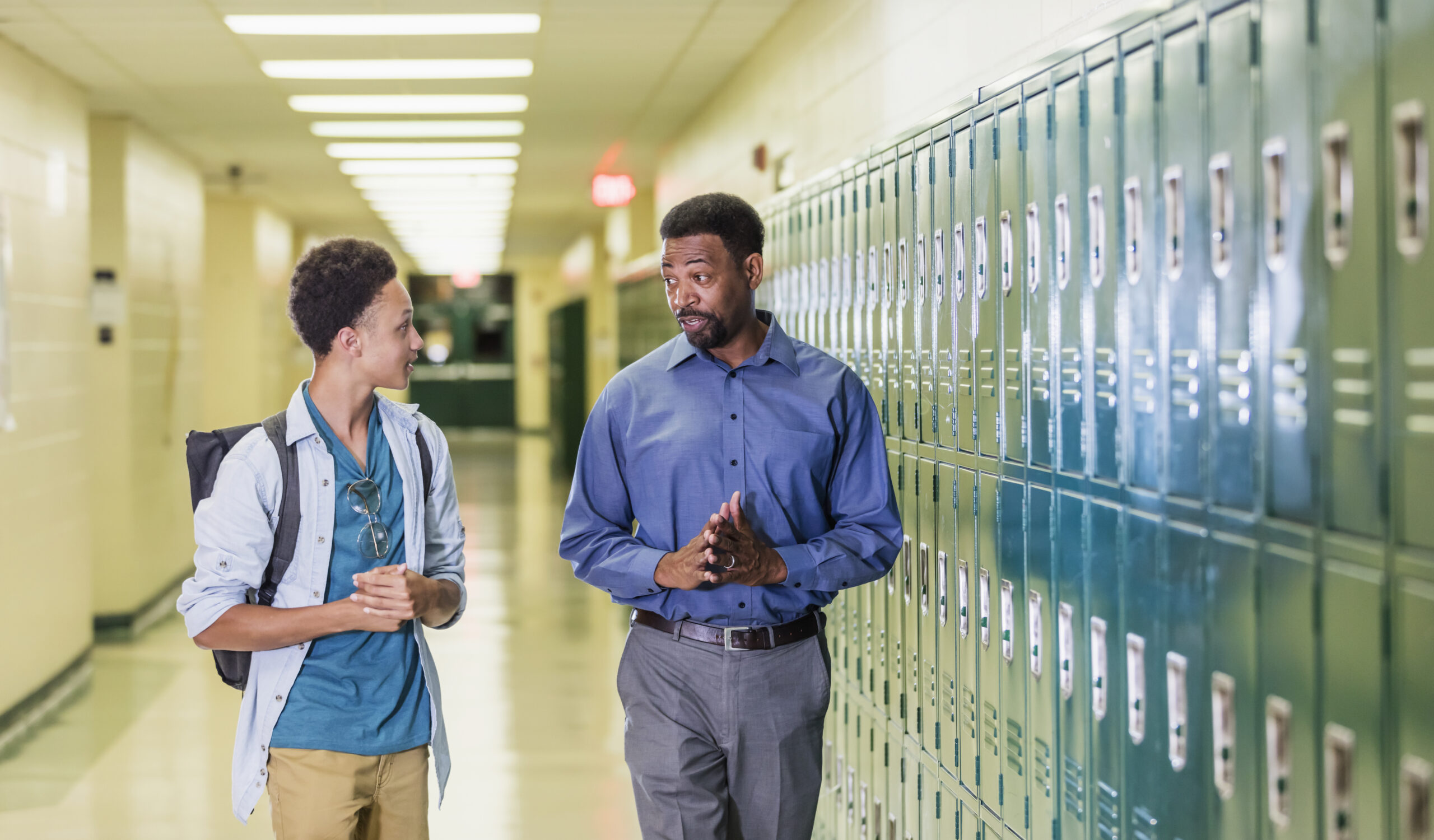
When Classes Resume—How to Help
Podcast & Video Review
As another school year approaches, teachers wonder how to help students get off to a strong start. Understanding how to support them is key to setting the stage for success.

Preparing Students with ADHD for College
Podcast & Video Review
Educational consultant Judy Bass delves into the challenges faced by high school and college students with executive function difficulties.

What Does New FDA Label Requirement Mean for Parents, Prescribers?
ADHD Weekly
A new labeling requirement highlights weight loss, a known possibility when young children take stimulant medication. Behavioral management, not medication, remains the primary treatment for ADHD in preschool-age children.

Video Games and ADHD: Harmful or Helpful?
Podcast & Video Review
Randy Kulman, PhD, explores how kids with ADHD are affected by their video game play. He examines how and why video games can become overly engaging yet at the same time present opportunities for improving executive functions and problem-solving skills.

Neurodevelopmental Disorders and Epilepsy
Podcast & Video Review
Pediatric neurologist Shafali Jeste offers an expert overview of neurodevelopmental disorders—what they are, how they are diagnosed, and how they can overlap with conditions such as epilepsy, autism, ADHD, and learning delays.

Better Sleep Helps Teens Manage ADHD

Prioritize Praising Your Child with ADHD
ADHD Weekly
Children and teens who have ADHD hear more negative messages about themselves than they do positive messages. You can help build up your child’s self-esteem by noticing and complimenting them on their accomplishments.

Teens & Parents: Understanding Strategies to Reduce Conflict
Ask the Expert Webinars
Psychologist Rosanna Breaux provides parents with an understanding of some reasons why family conflict is often common during adolescence, and particularly among families of teens with ADHD.

Putting the Skids on Summer Slide
By Shari Gent, MS, NCED
Be sure to listen carefully to your child when making decisions about the best summertime activities.

Ace the Break
By Ann Dolin, MEd
Use this time as an opportunity to give your child the tools and knowledge they need to start the next school year with greater confidence.
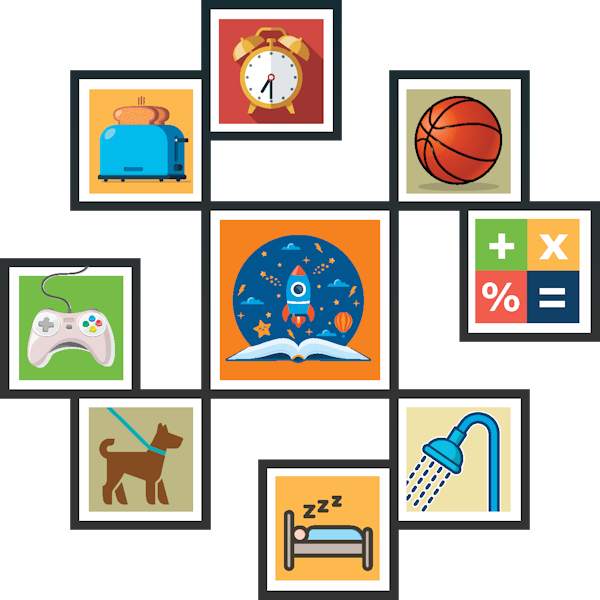
School’s Out: Give Summer Some Structure
By Carey A. Heller, PsyD
Kids with ADHD need just enough structure and routines that allow for maximum enjoyment but minimal long-term disruption.

The Art of Getting Kids to Listen
Podcast & Video Review
Sometimes it feels like your child just is not listening to you. Are they getting a reward for being stubborn or selfish? This is a very common thought, but more often, the behaviors come from a lack of listening skills, one of several executive function skills.

Next Steps: College and Career Prep for Young Adults with ADHD
Podcast & Video Review
Ari Tuckman, PsyD, and Stephanie Sarkis, PhD, answer questions from parents about today’s college experience, how their new college student can request accommodations, and the amount of support parents should provide their college-age children.

Helping Your Young Adult Become Independent
Podcast & Video Review
Ari Tuckman, PsyD, and Stephanie Sarkis, PhD, answer questions from parents about today’s college experience, how their new college student can request accommodations, and the amount of support parents should provide their college-age children.

Support Your Child with ADHD Through Transitions
Ask the Expert Webinar Series
Join ADHD Coach Brittany Brousseau for this empowering and practical workshop designed for parents of children with ADHD who are preparing for big school transitions—from elementary to middle school, middle to high school, and high school to college.

Parental Guilt and Shame
By David Palmiter, PhD, ABPP
As parents, we tend to overestimate the consequences of our mistakes.

It’s Never About Me
By Jane Indergaard, DNP, RN
Siblings say they feel their parents are too busy supporting the child who has ADHD. With limited time, energy, and emotional reserve, how can you be there for everyone in the family?

Summer Camp as a Growth Experience for Your Child
By John Willson MS, LRT/CTRS
Search for opportunities that nurture their gifts and help them overcome their challenges.

Mental Health for Teens with ADHD
Podcast & Video Digest
Have you wondered if your child has depression or anxiety and if these conditions could be connected to their ADHD? Dr. Carolyn Lentzsch-Parcells talks about the signs and causes of different mental health disorders in teens and the common treatment plans available.

ADHD Medication and College Students: Prevent Misuse, Abuse, and Diversion
Podcast & Video Digest
Although prescription stimulants are often highly effective in reducing ADHD, problems of non-medical misuse and abuse of prescription stimulants among adolescents, college students, and adults have become evident in recent years.

Does My Child Need a Tutor or a Coach?
By Margaret Foster, MEd
The answer is not all that obvious because many tutors coach their students, and many coaches tutor. It’s enough to make your head swim!

Why Does Sam Struggle with School Projects?
By Eran Grayson, MA
Deficits in executive functioning explain poor academic performance and underachievement in many students with ADHD. Here’s why they struggle and how to help.

Understanding and Supporting Your Emerging Adult
By Michael Reiter, PhD
As your teen approaches adulthood, the new normal may require you to do some out-of-the-box thinking. Perhaps the most important thing you can do is to communicate positively.

When Smart Children, Teens, and Young Adults on the Autism Spectrum Have ADHD
More than half of individuals diagnosed with autism spectrum disorder also have ADHD. Yet often their ADHD is overlooked and not adequately treated, because many clinicians and educators recognize ASD but do not see ADHD. This is especially true for those children, teens, and young adults on the spectrum whose IQ is average or above average.

What You Need to Know When Your Child Has Autism and ADHD
Are you wondering how ADHD and autism can seem to share some characteristics and yet be very different disorders? Many families have been told their children are affected by both ADHD and autism, but until recently, the Diagnostic and Statistical Manual of Mental Disorders stated that they were exclusive conditions. Now families and individuals are working out what it means for diagnosis and treatment for these conditions to be acknowledged as possibly co-occurring.

Help Your Teen with ADHD Prepare for and Navigate College
April is Autism Awareness Month. For many families, ASD and ADHD go hand in hand and require treatment that takes both conditions into account.

Autism Awareness Month Highlights Connection Between ASD and ADHD
April is Autism Awareness Month. For many families, ASD and ADHD go hand in hand and require treatment that takes both conditions into account.
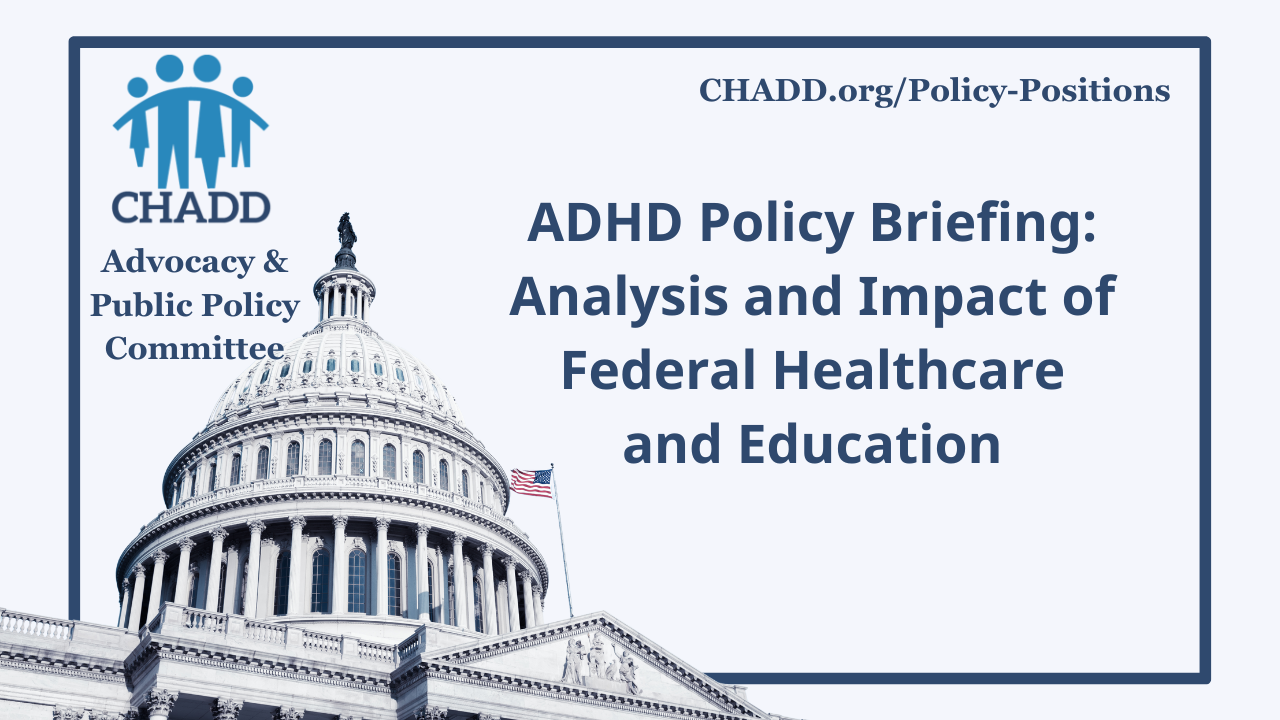
Advocacy Webinar: The Effects of Federal Healthcare and Education Policies
Several proposed federal policies have the potential to affect ADHD diagnosis, treatment, and educational support for individuals and families. Experts in ADHD diagnosis and treatment will review research-based responses to the Make America Healthy Again (MAHA) Commission's claims about ADHD. They will also discuss the critical role the US Department of Education plays in supporting students who have ADHD.

Sometimes Invisible: ADHD Without Hyperactivity
This presentation of ADHD mostly affects girls and is frequently overlooked. Accurate diagnosis and effective multimodal treatment could improve so many of their lives.

Principles for Parenting a Girl with ADHD
Parenting practices are essential to changing the trajectory for our daughters with ADHD.

How to Help Your Child Overcome Executive Function Challenges
We need executive function skills to manage everyday life. Many children with ADHD have executive function deficits, though. They need support when learning how to manage their time, stay organized, and be motivated. Parents can help their children learn how to improve in those challenging areas. Dr. Carey Heller provides insights on executive function coaching and offers strategies parents can use to help children thrive.

Understanding Stimulant Misuse Among College Students
College students are often under pressure to “share” their ADHD medications. They may also misuse their medications in an effort to keep up with their academic and social lives. What factors can drive this behavior, and how can students avoid situations that could lead to misuse?

Help Kids with ADHD Build Social Skills and Resilience in a Digital World
Children with ADHD face unique challenges in today’s social landscape—from navigating digital communication to managing hybrid learning environments. Clinical psychologist Sharon Saline, PsyD, offers caregivers and educators practical strategies to help children boost social awareness, reduce anxiety, and foster meaningful connections, both online and in person.

Using Context to Build and Enhance Executive Functioning
Margaret Foster, MAEd, presents a comprehensive look at how teaching executive function skills within real-life contexts can dramatically improve student outcomes. She explores the integration of content skills with practical strategies—tailoring interventions to meet the specific academic demands of each subject—to help students overcome challenges like ADHD, anxiety, and stress.

Behavioral Support and 504 Plans
Section 504 plans are helpful for more than academic accommodations.

Stay Cool Through the Yule
Revisit a perennial favorite for timeless advice before the seasonal chaos sets in.

Teens & Parents: Understanding Strategies to Reduce Conflict
Psychologist Rosanna Breaux discusses ways to reduce conflict with teens who have ADHD. Adolescents experience a host of challenges—difficulties managing their emotions, academic difficulties, social difficulties, and increased likelihood to engage in risky behaviors due to poor impulse control. Dr. Breaux offers parents tips and strategies to help them cope with emotion dysregulation in their teens and reduce family conflict.

Understanding ADHD from a Strengths-Based Perspective
Through a positive psychology approach, students with ADHD may gain increased self-esteem and optimism for the future.

Treating Children for ADHD Can Have Benefits for the Next Generation
Addressing ADHD in children can help them be successful in their lives and may help to improve the lives of their future children.

Meeting the Challenges ADHD Presents for Students
ADHD Weekly
Your time spent helping students with ADHD control their behavior and stay on task may leave you feeling that you are neglecting their classmates.

Improving the Educational Experience for Black Students with ADHD
Schools can help to create environments where all students—of differing abilities, racial and cultural backgrounds, languages, and perspectives—can thrive.

School-Based Interventions for Adolescents with ADHD
Recent studies investigated the outcomes of two school-based programs, one delivered by mental health professionals and the other delivered by peers. What did the researchers learn?
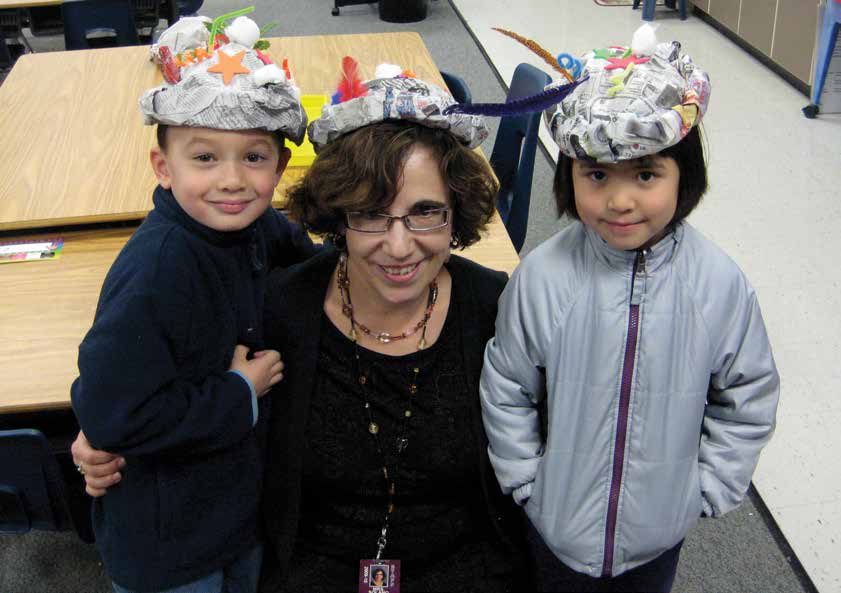
Everything I Know I Learned in Kindergarten
A CHADD Educator of the Year shares her advice for teaching students with ADHD. You can adapt her suggestions to help them succeed in your classroom, whether you’ll teach remotely or return to a school building this semester.

ADHD in the Classroom: Simple Strategies & Principles
By Carey A. Heller, PsyD
Tools and interventions that benefit the class as a whole are a good starting point for educators who want to support students who have ADHD.

Think You Can Spot ADHD in Your Classroom?
By Cynthia Hammer, MSW
You likely have one or more students with the inattentive presentation of ADHD, but you might not know what to look for and how to support them.

Reading Comprehension and Executive Function
By Debbie Tracht
While EF skills differ in each individual and overlap across a spectrum, the core skills of self-regulation, working memory, and cognitive flexibility have substantial impact on reading.

IEPs, 504 Plans, and the New Educational Landscape
As they reopened after COVID, schools needed to pay particular attention to helping students with special educational needs resume progress in their learning.

Hope and Help for Anxious Kids
Read about a comprehensive online resource developed to provide parents, teachers, and healthcare providers with specific evidence-based tools to help children with anxiety and related conditions.

Getting Kids Active Every Day
We all know that exercise benefits a child’s ability to learn. Here’s a program that includes plans for short bursts of activity easily woven into the classroom.

How to Build Self-Motivation in Teens with ADHD
Motivation problems can be a struggle for teens with ADHD. In school, this directly impacts a student’s academic work.
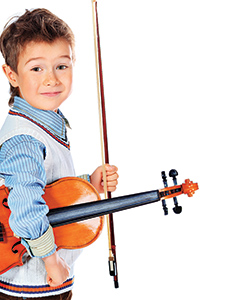
What Makes a Good Accommodation?
Modifications that seem “enabling” may actually be “supporting”—providing a short-term solution until a behavior can be learned or a problem can be solved. Here’s what educators and parents can look for.

Not In Our School
By Mark Katz
Read about a student-to-student campaign to create a safe and inclusive school day for all.

Compassionate, Trauma-Responsive Schools
By Mark Katz
Read about a model—developed by educators—for creating schools that can help to mitigate students’ stress-related learning problems and improve their educational and learning outcomes.

Five Keys to Developing Executive Function Skills at School and at Home
Ask the Expert Webinar Series
Educator Julie Principe will share five keys to developing executive function skills that build on strengths and support growth in independence at school and at home.

Practice of Informal Removal Limits Students’ Education
ADHD Weekly
Children who have ADHD and other disabilities are more likely to be repeatedly sent home from school for behaviors related to their disabilities rather than having their needs addressed in a formal accommodations plan.

Honoring Educators at #ADHD2022
Attention Magazine
Congratulations to both deserving educators, along with CHADD’s deep gratitude for their dedication to students with ADHD.

Gender Myths & ADHD
By Ellen B. Littman, PhD
Once excluded from the conversation, girls were overlooked—because girls with ADHD look very different from boys with ADHD.

The Walking Classroom
By Mark Katz, PhD
This innovative program, developed by a former fifth grade teacher, combines daily physical exercise with a structured school lesson plan.

Remote Learning for Children with ADHD
By Yuanyuan Jiang, PhD, and Minyeong Cho, BA
Research on how these students fared with online classes during the pandemic can help us understand how to help them now.
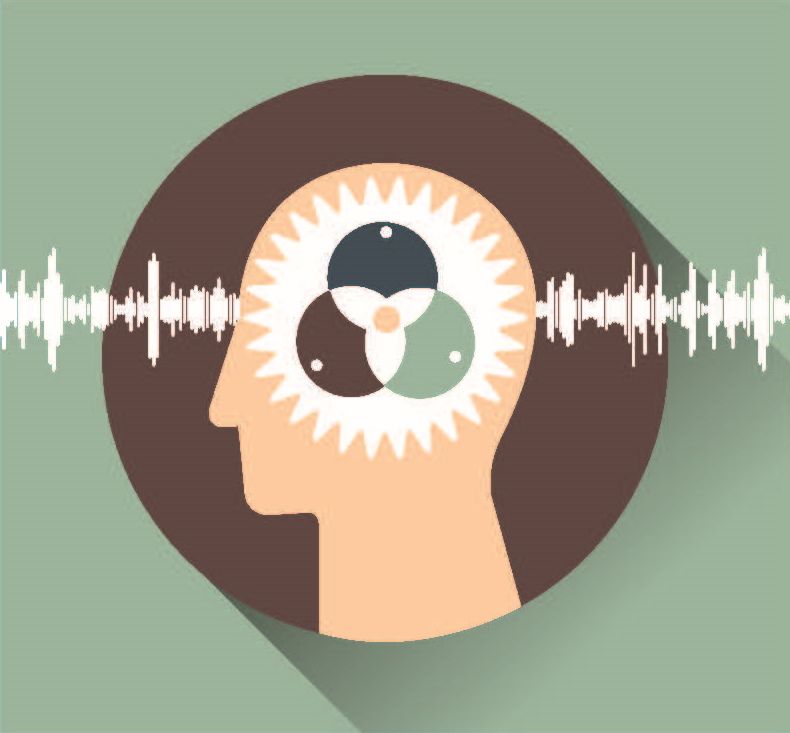
The Executive Function Podcast
By Mark Katz, PhD
Each episode focuses on one executive function and provides actionable steps for building each skill—for educators and parents as well as adults and students who have ADHD.

Tailored for Young Learners: SMARTS Elementary
By Mark Katz, PhD
How do we empower children to tackle difficult problems and achieve personal goals, both in school and in life? One possible way is to immerse them in a school culture that values, fosters, and celebrates metacognitive awareness.

Providing Perspective Through My ADHD Story
By Mallory Band, MSEd
An executive function coach shares her story with her students because she was them.

The Downside to Technology for Students with ADHD
By Christine L. Robinson, MEd
So many authorities say technology is good for students, but for those who have ADHD, we may need to take a second look.

Building Relationships in the Classroom
By Mark Katz, PhD
This innovative social-emotional learning curriculum for elementary schools provides teachers with tools and strategies to help all students feel they belong.
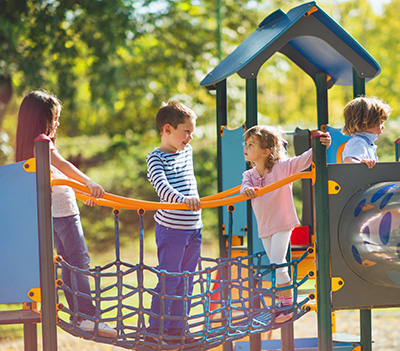
Is Recess a Luxury?
By Barbara Hawkins
Students with behavioral issues can lose recess as a consequence for their behaviors. What does this mean for their learning and health?

Webinar for Professionals: Working with Latino Patients and Their Families
Ask the Expert Webinar Series
Cultural norms, along with barriers to healthcare, in Latino communities can affect how ADHD symptoms in children are recognized or acknowledged. This webinar for professionals will explore how to provide services for Hispanic/Latino families in culturally appropriate ways.

What Is School Readiness and Why Is It Important?
By Noelle Suntheimer, MSEd
Teacher-child relationships are vital for children’s development and learning, particularly in the early years.
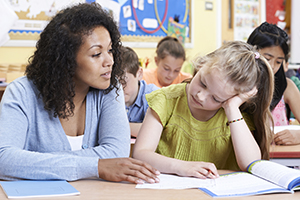
Webinar for Educators: Tips and Strategies to Help an Unmotivated Kid
Ask the Expert Webinar Series
The biology of ADHD can lead to an atypical response to rewards—which translates into prominent motivation deficits for many children and teens with the disorder. Dr. Margaret Sibley will discuss how to maximize the motivation of young people who have ADHD. She will discuss why motivation is often impaired by ADHD and what educators can to do support and empower youth who struggle with motivation.

Webinar: Caring for Children with Tourette Syndrome Virtual Course
Partner Webinar
This free course is provides clinicians with practical tips, knowledge, and resources to effectively identify and diagnose Tourette Syndrome and other tic disorders. Participants will come away with skills to effectively diagnose children and adolescents with Tourette Syndrome and other tic disorders. Learn from leading experts an overview of Tourette Syndrome; how to identify tics and co-occurring conditions, along with management and treatment strategies.

Tailored for Young Learners
By Mark Katz, PhD
A school culture that values, fosters, and celebrates metacognitive awareness can empower students to tackle difficult problems and achieve personal goals.

Leading Students from Supported Instruction to Responsible Independence
By Margaret Foster, MAEd
At times “You’re on your own!” is the right thing to say, but most often our students need much more.

Does Exercise Improve ADHD and Related Challenges?
By Yuanyuan Jiang, PhD, and Katrina Aranas, MEd
Two recent studies considered whether exercise affected executive functions, motor skills, mood, behavior, and academic productivity in students with and without ADHD.

2022 Educator of the Year Award Nominations Open
Annual International Conference on ADHD
Learn more about the award and how to nominate an outstanding educator for the 2022 Educator of the Year Award.

ADHD and the Effects of COVID-19 on Health and Education
ADHD Weekly
Researchers are learning more about how the pandemic has affected the health and education of people who have ADHD.

Replace Suspensions with Reset Rooms
By Melissa Peterson Malen, PhD
Rather than isolating students, this restorative practice innovation facilitates communication, empathy, and emotional and behavioral coaching.

What the Pandemic Taught Us About Students with ADHD
By Frank Mills
These issues may have already been present, but were highly exacerbated when students were forced to attend school from home.
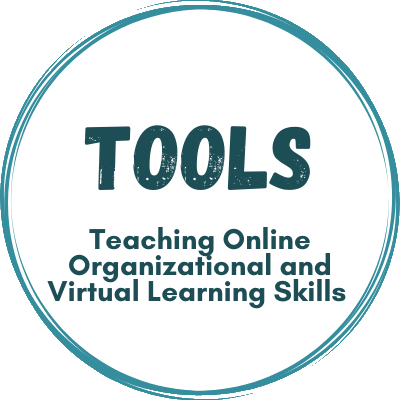
TOOLS: Teaching Online Organizational & Virtual Learning Skills
By Joyce Lui, PhD
A new video series describes evidence-based strategies for students with ADHD and their adult supports.

Finding Focus: Attention Training for High Schools
By Mark Katz, PhD
Accessible online and through an app, this mindfulness-based attention training course is designed to increase focus, reduce stress, and help to regulate emotions.
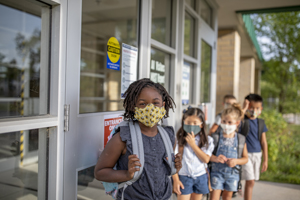
School-Based Services for Children with ADHD
By Yuanyuan Jiang, PhD, and Minyeong Cho
School-based interventions have been shown to be helpful for children with ADHD. Which students are more likely to get the services they need, and which may be at greater risk for missing out?

Providing Perspective Through My ADHD Story
By Mallory Band, MSEd
She shares her story with her students because she once was them.

How to Motivate and Engage Twice Exceptional Learners
By Julie Skolnick, MA, JD
Intentional, strengths-based strategies can support gifted students with ADHD.
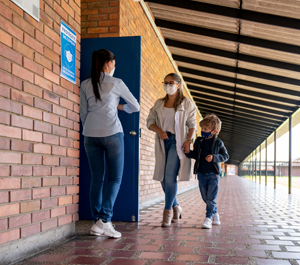
Webinar for Educators: IEPs, 504 plans, and the New Educational Landscape
Ask the Expert Webinar Series
As schools reopen during the COVID-19 pandemic, special attention needs to be paid to how to help students with special educational needs resume progress in their learning. Parents and educators should consider these several questions.

Webinar for Educators: When Classes Resume—How to Help
Ask the Expert Webinar Series
Another school year has arrived, and you may wonder how to help your students have a smoother start. This school year will be different, as the majority of students return to in-person learning. Being in the classroom once more make take some getting use for both students and educators.

Tailored for Young Learners: SMARTS Elementary
By Mark Katz, PhD
Learn about a curriculum designed to create a culture of executive function users.

Game-Based Learning
By Mark Katz, PhD
Read about an ongoing, small-group executive function training program for students aged 8-15 that uses popular video games and apps as teaching tools.

Building Relationships in the Classroom
By Mark Katz, PhD
School can be a lonely place for children with ADHD or learning differences. This innovative social-emotional learning curriculum gives teachers tools to help them.

Masks May Still Be Required When Schools Open
ADHD Weekly
Students returning to in-person instruction may still need to wear face coverings. Is your child with ADHD ready for the new school year?

The ReThink Stress Program
By Mark Katz, PhD
When we learn to see stress as potentially helpful rather than inevitably harmful, we accrue benefits to our health, productivity, and well-being.

ADHD Treatment in School-Aged Youth
By Lauren Haack, PhD
What are the best school-based practices for children and adolescents with ADHD? Which treatments are they receiving?

PAX Tools
By Mark Katz, PhD
Educators and parents can use these simple, evidence-based strategies to help improve children’s self-control and emotional self-regulation skills.

Sensory Classroom Interventions
By Lauren Haack, PhD, and Madeline Spiess
Two recent studies evaluated the drawbacks and benefits of sensory classroom interventions—fidget spinners and wiggle seats.

Helpful Lessons for Raising Challenging Kids
Attention
With three children diagnosed with ADHD at different ages, this mother and educator gained a lot of wisdom.

Stepping Back to Move Forward
By Kathryn Essig, MEd, and Janet Price
How has the pandemic affected college readiness for graduating students who experience executive dysfunction or heightened anxiety? What transition options are available?

Teaching Executive Skills in Middle School
By Sue Ball, ABSNP, CPsych, and Laurie Faith
The Barriers & Strategies Protocol gives teachers a new option for responding to struggling students.

Webinar: Navigating College with ADHD
Ask the Expert Webinar Series
Are you a current or future college student who isn’t sure how to make a strong transition to higher education? Dr. Sharon Saline will help you figure out how to get what you need to set yourself up for success at college or university.

Teaching in a Pandemic: Upheavals, Adjustments, and Moving Forward
By Ashlee Van Boening, MEd
A teacher shares stories and creative tips to help other educators cope with students, their parents, and virtual classrooms.

Resilience in the Midst of Difficult Times
By Rachel Kitchens-Cole
A school social worker talks about providing mental health support to students with attention problems who are attending school from home.

The Purpose Challenge
By Mark Katz, PhD
This free online toolkit is filled with activities to help high school students—particularly seniors—discover the nature of purpose as it relates to their individual lives.
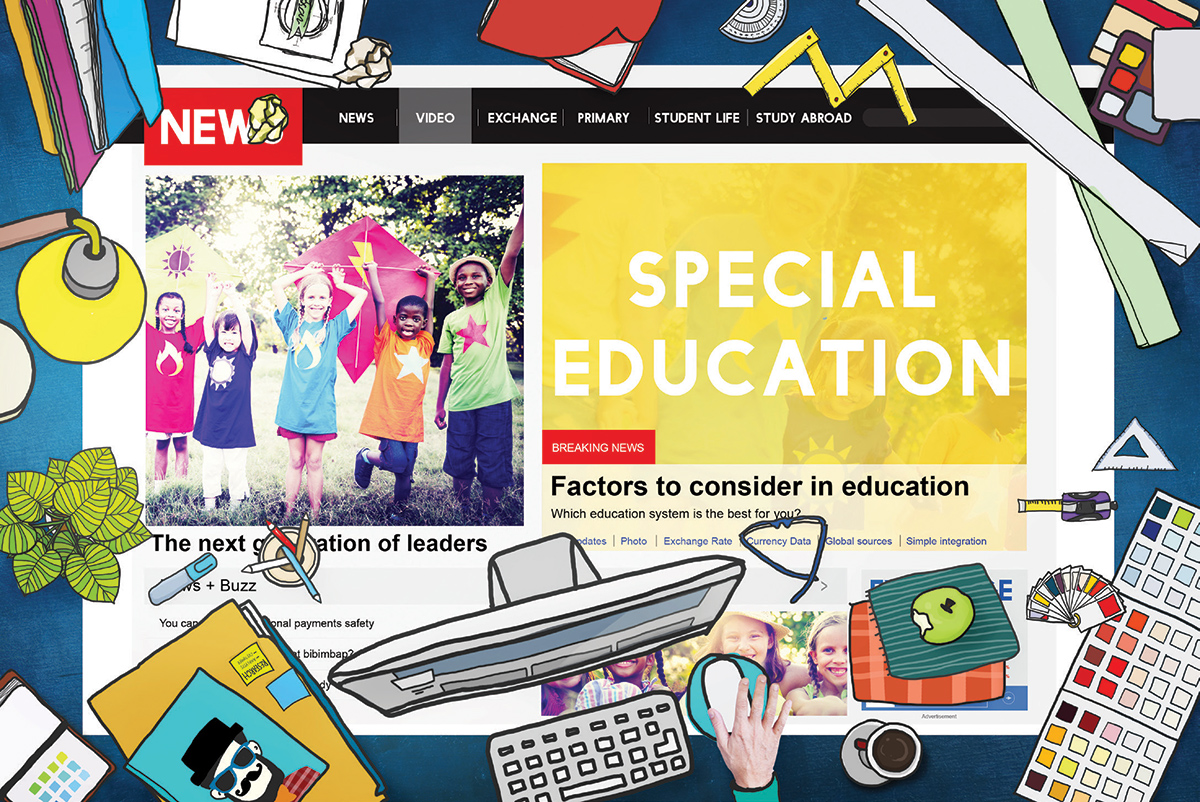
Special Education & the Pandemic: Three Things to Know
By Richard Weinfeld
Now, more than ever, parents, advocates, and school staff should do their best to work collaboratively in the best interest of each student.

What Do Students with ADHD Really Think About Remote Learning?
By Shari Gent, MS, NCED
We’ve heard from researchers and stressed-out working parents; now let’s listen to the students.
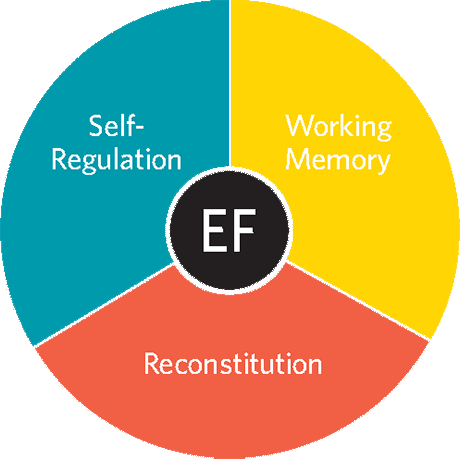
Executive Functioning Disorder and Mathematics
The math learning process does not need to stop when students struggle; instead, they need more effective strategies

STRIPES: Supporting Successful Transition to High School
This peer coaching program pairs academically successful eleventh or twelfth graders with ninth graders who struggle with ADHD symptoms.

Webinar: Teaching Students How to 'Work From Home'
Online learning can be very challenging for students with ADHD, and teachers are unsure of how to support them remotely. So how can we turn this difficult situation into a successful one for our students?
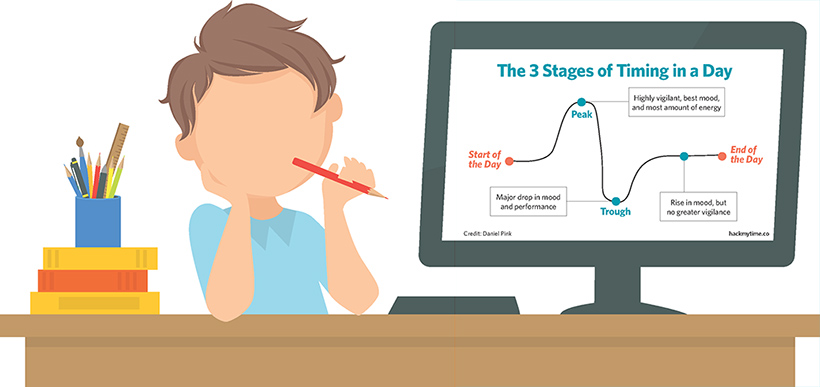
Balancing Virtual and Classroom Learning
How can you help parents keep their kids with ADHD on track so they have a successful school year? And maybe even help your own kids?

Strengthen Executive Function Skills During Distance Learning
Could improvements in these critical skills be one of the silver linings for children attending school remotely? Here are strategies and tools that can help to offset weaknesses related to ADHD and foster independence.

Balancing Your Job and Your Child’s Educational Needs
What is your family navigating this fall—remote learning, hybrid school schedules, working from home, or a return to your workplace? If ADHD is also in the mix, you’ll need to create structure to handle all the competing demands.

Leading Students from Supported Instruction to Responsible Independence
Here’s an approach that simplifies the learning and performance process and allows you to track its progress. You can use it to help students succeed even if you’re teaching remotely.

Home-School Collaboration: It’s Important for Children with ADHD
Consistency in implementing treatment programs requires effective communication between parents and teachers—and that partnership is more important now than ever.

Making Educational Content Stick Through Technology
Whether your classroom this fall is virtual or in-person, you’ll likely have students who struggle when material is presented orally. Here’s how you can turn topics visual and interactive to engage students with language comprehension, executive functioning, and attention issues.

